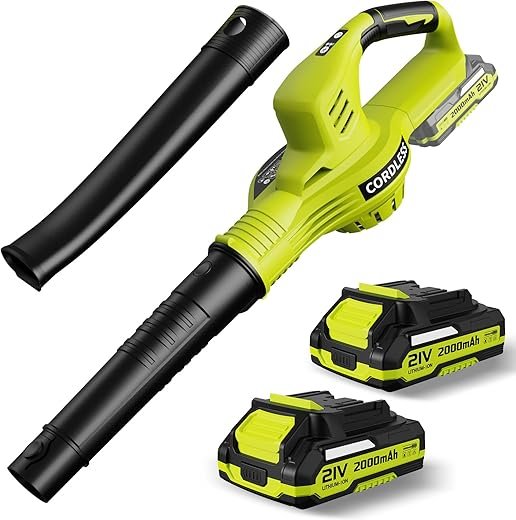As the leaves begin to fall and blanket our yards in vibrant colors, the task of keeping our outdoor spaces tidy becomes a priority for many homeowners. With so many options available, choosing the right leaf blower can feel overwhelming. Should you go with the convenience and quiet operation of an electric model, or the power and endurance of a gas blower? In this post, we’ll delve into the key differences between electric and gas leaf blowers, examining their pros and cons. By the end, you’ll be equipped with the knowledge to make an informed decision that aligns with your specific needs, budget, and values. Let’s navigate this decision together, ensuring your yard is ready for every season.
Performance Comparison: Electric vs. Gas Leaf Blowers
When it comes to choosing between electric and gas leaf blowers, performance is a key factor that can significantly influence your decision. In this section, we’ll break down performance aspects such as air speed, air volume, and overall efficiency, and highlight how each type performs in various scenarios.
Air Speed and Air Volume
One of the most critical aspects to consider in leaf blower performance is the combination of air speed and air volume, often referred to as CFM (Cubic Feet per Minute) and MPH (Miles Per Hour).
- Air Speed (MPH): This refers to how fast the air exits the blower. Higher air speeds are generally better for moving debris from hard surfaces.
- Air Volume (CFM): This measures how much air is being moved. A higher CFM is more effective for clearing larger areas covered with leaves or debris.
Electric Leaf Blowers
Electric leaf blowers, such as the EGO Power+ LB5804, typically feature air speeds ranging from 90 to 160 MPH and air volumes of about 400 to 600 CFM.
- Pros:
- Quiet operation, making them suitable for residential areas.
- Instant start with a push of a button.
- Lightweight and easy to maneuver.
- Cons:
- Limited run time depending on battery capacity, typically around 30-60 minutes.
- Performance can diminish with lower battery levels.
Gas Leaf Blowers
Gas-powered models like the Husqvarna 350BT tend to offer higher air speeds, often exceeding 200 MPH, and can have air volumes of 400 to 800 CFM.
- Pros:
- More powerful, making them suitable for heavy-duty tasks.
- Extended run times, as they can be refueled quickly.
- Better for larger yards or dense debris.
- Cons:
- Heavier and bulkier, which can lead to user fatigue.
- Louder operation, which may disturb neighbors and wildlife.
Performance in Different Scenarios
1. Clearing Leaves from a Driveway
For small, hard surfaces like driveways or patios, electric leaf blowers often outperform gas models due to their ease of use and lighter weight.
- Recommended Model: Black+Decker LSW221 – With an air speed of 130 MPH and runtime that exceeds 30 minutes, this model is perfect for quick clean-ups on smaller surfaces.
2. Clearing a Large Yard
When tackling large yards covered in heavy leaves or debris, gas leaf blowers take the lead. Their higher air speed and volume allow for efficient clearing over larger areas.
- Recommended Model: Echo PB-580T – This gas blower boasts an air speed of 215 MPH and a maximum CFM of 510, making it ideal for heavy-duty leaf clearing tasks in expansive spaces.
User Experiences and Expert Opinions
User experiences vary significantly between electric and gas leaf blowers.
- Electric Blower Users: Many users appreciate the low maintenance and quiet operation of electric models. For instance, a user of the EGO Power+ LB5804 remarked, “I love how light it is and that I can just plug it in and start working without worrying about gas or oil.”
- Gas Blower Users: Conversely, users of gas blowers often highlight their power and reliability in tough conditions. An owner of the Husqvarna 350BT stated, “This blower handles wet leaves like a champ. I can clear my entire yard in no time.”
Summary Table of Key Comparison Points
| Feature | Electric Leaf Blower | Gas Leaf Blower |
|---|---|---|
| Air Speed | 90 – 160 MPH | 200+ MPH |
| Air Volume | 400 – 600 CFM | 400 – 800 CFM |
| Weight | Lighter (usually < 10 lbs) | Heavier (often 12 lbs+) |
| Runtime | 30 – 60 minutes on battery | Continuous with refueling |
| Noise Level | Quieter (60-70 dB) | Louder (80-100 dB) |
| Maintenance | Low (no fuel/oil needed) | Higher (fuel, oil, spark plugs) |
In summary, while both electric and gas leaf blowers have their pros and cons, the optimal choice often depends on your specific needs and the tasks you intend to tackle. Whether you favor the quieter, more manageable electric blowers or the powerful, long-lasting gas blowers, understanding these performance aspects can help guide your decision.
Environmental Impact
When it comes to maintaining our yards, the choice between electric and gas leaf blowers can have significant implications for the environment. This section will delve into the environmental considerations of both types of machines, focusing on noise pollution, emissions, and energy consumption.
Noise Pollution
One of the most immediate environmental impacts of leaf blowers is noise pollution. Gas leaf blowers are notorious for producing high decibel levels, often exceeding 100 decibels. For comparison, this is comparable to the noise level of a chainsaw or a rock concert. According to the California Air Resources Board (CARB), prolonged exposure to noise levels above 85 decibels can cause hearing damage.
Electric Leaf Blowers
- Decibel Levels: Most electric leaf blowers operate at around 60-70 decibels, which is significantly quieter than their gas counterparts.
- Community Impact: The reduced noise levels from electric models, such as the EGO Power+ LB5804 and the Greenworks 24012, can lead to less disruption in residential neighborhoods, making them more suitable for use during early mornings or late evenings.
Noise Comparison Table
| Type | Average Decibel Level | Impact on Community |
|---|---|---|
| Gas Leaf Blowers | 100+ dB | High disruption, not suitable for early/late use |
| Electric Leaf Blowers | 60-70 dB | Minimal disruption, suitable for all times |
Emissions
Another critical environmental consideration is the emissions produced by gas leaf blowers. Unlike electric models, gas-powered blowers emit harmful pollutants that can degrade air quality.
Gas Leaf Blower Emissions
- Pollutants: Gas leaf blowers emit carbon monoxide (CO), volatile organic compounds (VOCs), and nitrogen oxides (NOx). A study conducted by the California Air Resources Board found that one hour of operation from a gas leaf blower can produce as much smog-forming pollution as driving a newer vehicle for over 1,100 miles.
- Health Risks: These pollutants contribute to respiratory issues and can have long-term health effects on individuals, especially children and the elderly.
Electric Leaf Blower Benefits
- Zero Emissions: Electric leaf blowers, such as the Makita XBU03PT1 and the Ryobi RY40440, produce zero emissions during operation. This means they contribute to better air quality, making them a healthier choice for both users and surrounding communities.
Energy Consumption
When assessing the environmental impact of leaf blowers, energy consumption is another important factor.
Gas Leaf Blowers
- Fuel Consumption: Gas leaf blowers require fossil fuels, which not only contribute to greenhouse gas emissions but also deplete non-renewable resources.
- Cost of Fuel: The average cost of gasoline can also add up, contributing to ongoing operational costs for users.
Electric Leaf Blowers
- Energy Source: Electric models can be powered by renewable energy sources, such as solar or wind, significantly reducing their carbon footprint.
- Efficiency: For example, the DeWALT DCBL772X1 electric blower offers efficient battery use, allowing for longer operation times without the need for frequent recharging.
Energy Comparison Table
| Type | Fuel Source | Environmental Impact |
|---|---|---|
| Gas Leaf Blowers | Fossil Fuels | High emissions and resource depletion |
| Electric Leaf Blowers | Electricity (renewable options available) | Zero emissions, potential for renewable energy use |
Supporting Statistics and Research Findings
- A report by the Union of Concerned Scientists found that replacing gas-powered leaf blowers with electric models can reduce air pollutants by up to 90%.
- According to the Environmental Protection Agency (EPA), gas-powered yard equipment contributes to nearly 5% of the nation’s air pollution, highlighting the urgency to transition to more sustainable alternatives.
- A noise study conducted by the National Institute of Environmental Health Sciences indicates that communities with regulations restricting the use of gas-powered equipment see an improvement in overall neighborhood satisfaction and quality of life.
By understanding the environmental impact of electric versus gas leaf blowers, homeowners can make more informed choices that not only benefit their yards but also contribute to a healthier environment for their communities.
Choosing the Right Power Source for Your Yard Care Needs
In conclusion, choosing between electric and gas leaf blowers involves a careful consideration of key differences in performance, environmental impact, and cost. Electric leaf blowers are typically quieter, lighter, and more environmentally friendly, making them suitable for smaller yards and those concerned about emissions. In contrast, gas leaf blowers generally offer more power and longer run times, making them ideal for larger properties or tougher tasks, but they come with higher fuel costs and greater noise levels. As you evaluate your options, consider your specific needs, including yard size, environmental priorities, and budget constraints. Weighing the pros and cons will help you make an informed decision that best fits your landscaping requirements.
Explore products related to Blowers & Vacuums on Ninjagardentools.com.

